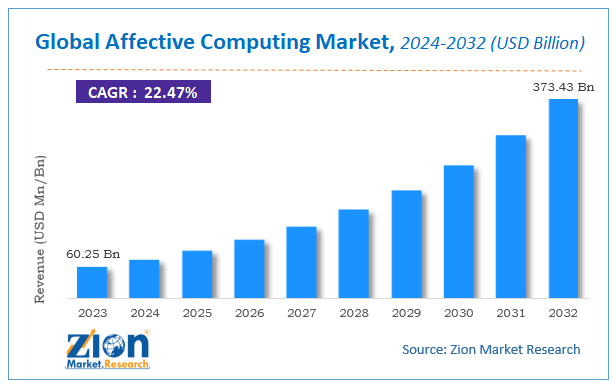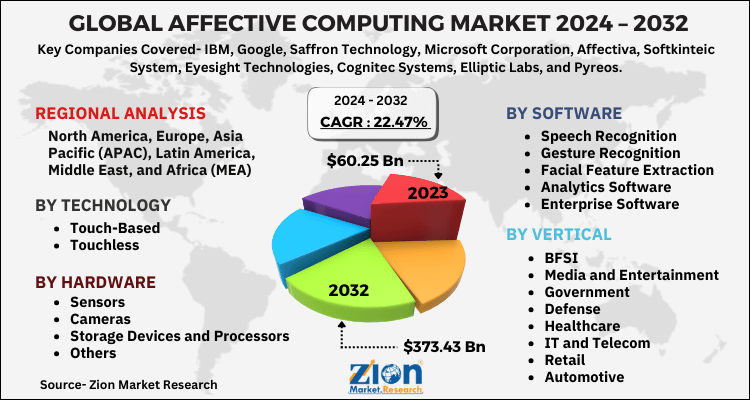Affective Computing Market Size, Share, And Growth Report 2032

Affective Computing Market By Technology (Touch-Based and Touchless), By Software (Gesture Recognition, Speech Recognition, Enterprise Software, Facial Feature Extraction, and Analytics Software), By Hardware (Sensors, Cameras, Storage Devices and Processors, and Others), and By Vertical (BFSI, Media & Entertainment, Government, Defense, Healthcare, IT & Telecom, Retail, and Automotive): Global Industry Perspective, Comprehensive Analysis, and Forecast, 2024-2032
| Market Size in 2023 | Market Forecast in 2032 | CAGR (in %) | Base Year |
|---|---|---|---|
| USD 60.25 Billion | USD 373.43 Billion | 22.47% | 2023 |
Affective Computing Market: Size
The global Affective Computing market size was worth around USD 3.25 billion in 2023 and is predicted to grow to around USD 7.77 billion by 2032 with a compound annual growth rate (CAGR) of roughly 10.15% between 2024 and 2032.
The study provides historical data from 2018 to 2022 along with a forecast from 2024 to 2032 based on revenue (USD billion). The report covers a forecast and an analysis of the Affective Computing market on a global and regional level.
Affective Computing Market: Overview
Affective computing is also referred to as artificial emotional intelligence/emotion AI. It is the development and study of devices that can interpret, recognize, simulate, and process effects created by humans. Affective computing is a mixture of computer science, psychology, and cognitive science.
The affective computing market is gaining popularity across numerous industries, such as healthcare, automotive, and banking, due to the wide affective computing adoption to identify the emotional state of consumers in real-time and analyze how consumers’ mind actually affects the buying/selling of products. Affective computing will help in identifying human emotions and decision-making by studying their one’s expressions, heart rate, voice, and other parameters. Moreover, the accelerating adoption of connected smart devices and increasing penetration of smart wearables and smart devices are expected to further fuel the affective computing market growth. The new innovations initiated by small enterprises are also accelerating the demand for affective computing. Furthermore, low-cost smartphones in the developing economies of China and India are also flourishing this global market. However, security issues, such as information theft, data theft, and susceptibility to malware infections, may curtail the affective computing market development over the forecast time period.
Affective Computing Market: Segmentation
The study provides a crucial view of the affective computing market by segmenting it based on technology, software, hardware, vertical, and region. All the segments of affective computing market have been analyzed based on present and future trends and the market is estimated from 2024 to 2032.
By software, the affective computing market includes gesture recognition, analytics software, facial feature extraction, enterprise software, and speech recognition. Facial feature extraction will hold a significant market share over the predicted time period, as it can process specific regions, landmarks, points, or curves in 2-D or 3-D images. This is useful in various industries, such as media and entertainment, academia and research, government and defense, IT and telecom, healthcare and life sciences, automotive retail and e-commerce, and BFSI.
Affective Computing Market: Report Scope
| Report Attributes | Report Details |
|---|---|
| Report Name | Affective Computing Market |
| Market Size in 2023 | USD 60.25 Billion |
| Market Forecast in 2032 | USD 373.43 Billion |
| Growth Rate | CAGR of 22.47% |
| Number of Pages | 168 |
| Key Companies Covered | IBM, Google, Saffron Technology, Microsoft Corporation, Affectiva, Softkinteic System, Eyesight Technologies, Cognitec Systems, Elliptic Labs, and Pyreos |
| Segments Covered | By technology, By software, By hardware, By vertical and By Region |
| Regions Covered | North America, Europe, Asia Pacific (APAC), Latin America, Middle East, and Africa (MEA) |
| Base Year | 2023 |
| Historical Year | 2018 to 2022 |
| Forecast Year | 2024 - 2032 |
| Customization Scope | Avail customized purchase options to meet your exact research needs. Request For Customization |
Affective Computing Market: Regional Analysis
The regional segment comprises the current and forecast demand for the Middle East and Africa, North America, Asia Pacific, Latin America, and Europe.
North America is predicted to hold a notable share in the global affective computing market, owing to the use of affective computing in the healthcare sector to monitor patients. The emotions of patients are communicated through three channels: body gestures, face, and audio, which will help in tracking the current situation/condition of patients. The medical devices are also equipped with empathic and voice assistant that can uplift or alter negative emotions. It is a known fact that emotions have a connection with human health. Frustration, unpleasant stressful situations, depression, and irritation have an intense negative impact on human health. Thus, the use of affective computing in the region’s healthcare sector is anticipated to fuel the affective computing market.
Affective Computing Market: Competitive Players
Some noticeable players of the affective computing market are:
- IBM
- Saffron Technology
- Microsoft Corporation
- Affectiva
- Softkinteic System
- Eyesight Technologies
- Cognitec Systems
- Elliptic Labs
- Pyreos
The Global Affective Computing Market is segmented as follows:
Global Affective Computing Market: Technology Analysis
- Touch-Based
- Touchless
Global Affective Computing Market: Software Analysis
- Speech Recognition
- Gesture Recognition
- Facial Feature Extraction
- Analytics Software
- Enterprise Software
Global Affective Computing Market: Hardware Analysis
- Sensors
- Cameras
- Storage Devices and Processors
- Others
Global Affective Computing Market: Vertical Analysis
- BFSI
- Media and Entertainment
- Government
- Defense
- Healthcare
- IT and Telecom
- Retail
- Automotive
Global Affective Computing Market: Regional Analysis
- North America
- The U.S.
- Europe
- UK
- France
- Germany
- Asia Pacific
- China
- Japan
- India
- Latin America
- Brazil
- Middle East and Africa
Table Of Content
Methodology
FrequentlyAsked Questions
Affective computing is also referred to as artificial emotional intelligence/emotion AI. It is the development and study of devices that can interpret, recognize, simulate, and process effects created by humans. Affective computing is a mixture of computer science, psychology, and cognitive science.
According to study, the Affective Computing Market size was worth around USD 3.25 billion in 2023 and is predicted to grow to around USD 7.77 billion by 2032.
The CAGR value of Affective Computing Market is expected to be around 10.15% during 2024-2032.
North America has been leading the Affective Computing Market and is anticipated to continue on the dominant position in the years to come.
The Affective Computing Market is led by players like IBM, Google, Saffron Technology, Microsoft Corporation, Affectiva, Softkinteic System, Eyesight Technologies, Cognitec Systems, Elliptic Labs, and Pyreos.
Choose License Type
RelatedNews
HappyClients
Zion Market Research
Tel: +1 (302) 444-0166
USA/Canada Toll Free No.+1 (855) 465-4651
3rd Floor,
Mrunal Paradise, Opp Maharaja Hotel,
Pimple Gurav, Pune 411061,
Maharashtra, India
Phone No +91 7768 006 007, +91 7768 006 008
US OFFICE NO +1 (302) 444-0166
US/CAN TOLL FREE +1 (855) 465-4651
Email: sales@zionmarketresearch.com
We have secured system to process your transaction.
Our support available to help you 24 hours a day, five days a week.
Monday - Friday: 9AM - 6PM
Saturday - Sunday: Closed







